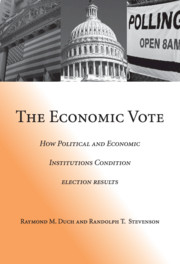Book contents
- Frontmatter
- Contents
- Preface
- 1 Introduction
- Part I Describing the Economic Vote in Western Democracies
- Part II A Contextual Theory of Rational Retrospective Economic Voting: Competency Signals
- Part III A Contextual Theory of Rational Retrospective Economic Voting: Strategic Voting
- Part IV Conclusion and Summary
- Appendix A
- Appendix B
- Appendix C
- References
- Index
- Cambridge Cultural Social Studies
Part II - A Contextual Theory of Rational Retrospective Economic Voting: Competency Signals
Published online by Cambridge University Press: 06 July 2010
- Frontmatter
- Contents
- Preface
- 1 Introduction
- Part I Describing the Economic Vote in Western Democracies
- Part II A Contextual Theory of Rational Retrospective Economic Voting: Competency Signals
- Part III A Contextual Theory of Rational Retrospective Economic Voting: Strategic Voting
- Part IV Conclusion and Summary
- Appendix A
- Appendix B
- Appendix C
- References
- Index
- Cambridge Cultural Social Studies
Summary
Part II begins by developing a rational model of retrospective voting in which voters extract signals about the competency of incumbent politicians from movements in the retrospective economy. Given this model of individual-level economic voting, we can explore how the quality of the competency signal that voters extract from the observed economy may vary across different contexts and, hence, induce different amounts of economic voting. Chapter 5 develops a selection model of the economic vote that first describes the competency signals that voters extract from macro-economic outcomes. We then explain how the quality of these competency signals condition the economic vote. Contexts in which the quality of these competency signals are high should generate more economic voting.
We argue in this chapter that political contexts can be distinguished in terms of the number of elected versus nonelected decision makers that are shaping political and economic policy making. And our theory suggests that the ratio of these elected to nonelected decision makers can condition the magnitude of these competency signals. As the ratio of decisions by nonelected decision makers to those by elected decision makers rises, the overall competency signal will decline and vice versa.
Chapter 6 provides empirical evidence that voters, indeed, are attentive to fluctuations in the macro-economy and are equipped to undertake the competency-signal-extraction task implied by our theory.
- Type
- Chapter
- Information
- The Economic VoteHow Political and Economic Institutions Condition Election Results, pp. 129 - 130Publisher: Cambridge University PressPrint publication year: 2008



